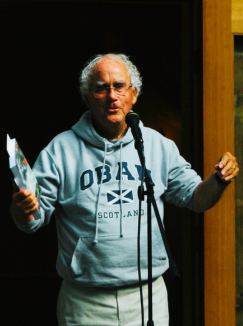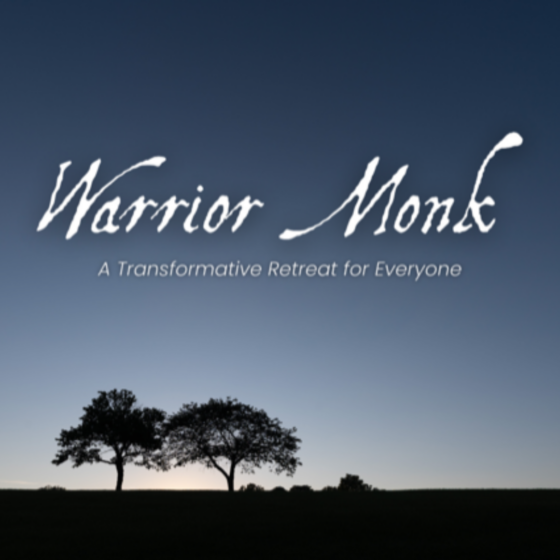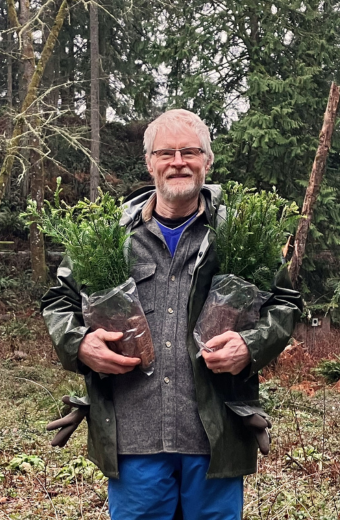The Grace of This Moment — 2023 Gratitude Report
For fullscreen view, click the arrows icon near the lower right corner of the report.
If you are inspired by the Grace of This Moment, please consider making a donation. Our annual GiveBIG fundraising campaign is active throughout May.
WILD IDEA – The Whidbey Institute Story by Fritz Hull
 I recently had the honor to sit down with Fritz Hull to talk about his latest book, “Wild Idea.” Published this past year, “Wild Idea” tells of how a seemingly crazy idea became a sizable force for good – the Whidbey Institute. We met at his family’s Hilltop Cabin in Legacy Forest. Built 10 years ago on 5-acres of land that is part of the original 1966 farm purchase, the cabin provided us with a peaceful setting to explore some of the ideas he shares in the book, the inspiration of the early Chinook days, and what the future might hold for the land and those who visit it.
I recently had the honor to sit down with Fritz Hull to talk about his latest book, “Wild Idea.” Published this past year, “Wild Idea” tells of how a seemingly crazy idea became a sizable force for good – the Whidbey Institute. We met at his family’s Hilltop Cabin in Legacy Forest. Built 10 years ago on 5-acres of land that is part of the original 1966 farm purchase, the cabin provided us with a peaceful setting to explore some of the ideas he shares in the book, the inspiration of the early Chinook days, and what the future might hold for the land and those who visit it.
What were the origins for this book?
About four years ago I felt the need to write the story of Chinook/Whidbey Institute, and so I began a long and fairly demanding task. I wrote it for those who have had significant experiences here, who want to remember the earlier times, and want to see their time here in the larger sweep of the organization’s journey. I have been asked a lot about the early community, those who were with Vivienne and me, who formed the early work, led workshops, proceeded always by consensus, and set the whole enterprise in motion. Who were they? What held them together? How were they inspired? I love these questions because I feel a growing respect for those who built this place and steward it so faithfully. But I wrote it even more for those here now, and for those who are coming. This long 50-year story had never been written and I felt it was essential that I could hand people the story, for now it is also their story as they build the future. Read More →
A Conversation with Brian Thomas Swimme – The New Cosmic Story
 We at “The Center for Knowing Home” (a new educational project of The Whidbey Institute launched by Fritz Hull) are excited to welcome Brian Thomas Swimme back to the Thomas Berry Hall at the Whidbey Institute this Summer!
We at “The Center for Knowing Home” (a new educational project of The Whidbey Institute launched by Fritz Hull) are excited to welcome Brian Thomas Swimme back to the Thomas Berry Hall at the Whidbey Institute this Summer!
My name is Marilyn Strong, I live adjacent to the Institute and was a member of the covenant community that supported the early work of the Institute, (formerly known as The Chinook Learning Center) and for six years was Director of Education here.
Brian and I first became acquainted in 1986 when I took time away from Chinook to attend Matthew Fox’s Institute for Culture and Creation Spirituality in the Oakland, California foothills to get my master’s degree and deepen my knowledge and skills in working with adults in spiritually based education. Brian’s class, called “Cosmos as Primary Revelation,” was the highlight of my nine months of study. The course was based on Thomas Berry’s twelve principles of the universe, and because of Brian’s infectious enthusiasm and joy as a teacher and as a human being, my life was irrevocably changed.
Fast forward to February 2023, Fritz Hull had just published his book, Wild Idea: The Whidbey Institute Story, and we were heading into the Whidbey Institute’s 50th Anniversary. Brian had just published Cosmogenesis, the first of his books in which he has told some of his own story in relation to the story of the Universe, (combining autobiography and cosmology) and how the impact of this New Cosmic Story “deconstructed his mind and then reassembled it.” Some of his stories took place during the years that I was on staff at Chinook, 1982 to 1988 and many of the characters that he talks about I had had the privilege to know, study and work with. For me, reading the book felt like coming home, full circle, and I wanted to reconnect with him. To my delight, he and his wife, Denise, agreed to come to The Whidbey Institute to see the beautiful new campus, to visit and become reacquainted with Fritz and Vivienne Hull, some of the staff and board of the current Institute and those of us working to bring “The Center for Knowing Home” into being. From that visit, a new collaboration was born. Read More →
A Conversation with Michelle C. Johnson and Rashid Hughes
 The Whidbey Institute is excited to welcome Michelle C. Johnson and Rashid Hughes to the land for their Rest and Refuge Retreat on August 8-12. Spiritual teachers Michelle C. Johnson and Rashid Hughes will be guiding participants through a transformative experience focused on deep rest, restoration, and connection with nature and the elements. Michelle, an author, activist, and racial equity consultant, brings her expertise in dismantling racism and creating ritual in justice spaces to the retreat. Rashid, a meditation teacher and restorative justice facilitator, will share his rest-centered meditation practice, the Four Pillars of R.E.S.T., offering a path to rediscovering belonging and meaning in the present moment. Together, they will lead sessions in movement, self-study, meditation, and yogic teachings, providing a unique opportunity for participants to find peace, wakefulness, and harmony in a supportive and contemplative environment.
The Whidbey Institute is excited to welcome Michelle C. Johnson and Rashid Hughes to the land for their Rest and Refuge Retreat on August 8-12. Spiritual teachers Michelle C. Johnson and Rashid Hughes will be guiding participants through a transformative experience focused on deep rest, restoration, and connection with nature and the elements. Michelle, an author, activist, and racial equity consultant, brings her expertise in dismantling racism and creating ritual in justice spaces to the retreat. Rashid, a meditation teacher and restorative justice facilitator, will share his rest-centered meditation practice, the Four Pillars of R.E.S.T., offering a path to rediscovering belonging and meaning in the present moment. Together, they will lead sessions in movement, self-study, meditation, and yogic teachings, providing a unique opportunity for participants to find peace, wakefulness, and harmony in a supportive and contemplative environment.
Michelle and Rashid shared with me a conversation they recently had to learn more about their work and what they hope to offer participants through their Rest and Refuge Retreat.
Michelle: Rashid, do you want to share first about who you are and what you’re up to in the world?
Rashid Hughes: I’m Rashid Hughes, and my pronouns are he/him. I kind of consider myself to be, I guess, an intersectional contemplative practitioner and someone who loves to explore what it means to be well and happy and engaged in the world. For me, contemplative spirituality really provides this approach to tending to our inner wounds while also accessing a sense of wholeness through touching into something more expansive within ourselves, beyond the wounds and trauma. Something a little truer and maybe more primordial, I guess, is who we are other than the wounds and where they hurt, not disregarding the wounds and where they hurt, but we are also more than that. For me, contemplative spiritualities provide this lens, this motivation, this conviction that it’s important that this inner awakening, this heartfeltness, also shows up in how we live and are in the world as well. So that’s a little bit about what I’m curious about and what kind of makes me happy to think about. Read More →
A Transformative Space – Reflections on Warrior Monk
 The night before the retreat, as I packed up my things and prepared to say goodbye to my family for the next week, it occurred to me: I actually had no idea what I was getting myself into. I had met Dan McKee a few years ago through my work in leadership development, and he had become an important mentor to me in my leadership professional life. When he suggested I might get value out of attending the retreat, my inclination was to trust him and to say yes. And yet, here I was, feeling somewhat unsure of what I had committed to and finding fear creeping in. Five days away, in a place I didn’t know, with people I didn’t know, with no real sense of what we would be doing.
The night before the retreat, as I packed up my things and prepared to say goodbye to my family for the next week, it occurred to me: I actually had no idea what I was getting myself into. I had met Dan McKee a few years ago through my work in leadership development, and he had become an important mentor to me in my leadership professional life. When he suggested I might get value out of attending the retreat, my inclination was to trust him and to say yes. And yet, here I was, feeling somewhat unsure of what I had committed to and finding fear creeping in. Five days away, in a place I didn’t know, with people I didn’t know, with no real sense of what we would be doing.
As a Mom to two young children, time away feels particularly precious, and I found myself starting to wonder what I had signed myself up for. Just the week before in a check in with Dan, I felt myself squirming a little bit: things are actually going quite well in my life right now! I’m not sure I need to shake them up? Do you think it still makes sense for me to come? And his response: you’ll take what you need from the work because you want to grow. And so, I chose to trust in the mystery that lay ahead and believe that there was a reason this had come up on the path. I’m so glad I did.
An Interview with Larry Rohan, the Whidbey Institute’s new Forest Steward
 I recently had a chance to sit down with Larry Rohan, the Whidbey Institute’s new Forest Steward. Larry embodies a deep-rooted passion for the natural world, cultivated over a lifetime of exploration and study. With a BS in Forestry from Purdue University and experience with the US Forest Service and Alaska native tribes, Larry brings a wealth of knowledge to this new role at the Whidbey Institute. His work is driven by a profound understanding of the interconnectedness between forests, soil, and climate and his dedication to conservation and environmental stewardship is not only a testament to his commitment to creating a better world for future generations.
I recently had a chance to sit down with Larry Rohan, the Whidbey Institute’s new Forest Steward. Larry embodies a deep-rooted passion for the natural world, cultivated over a lifetime of exploration and study. With a BS in Forestry from Purdue University and experience with the US Forest Service and Alaska native tribes, Larry brings a wealth of knowledge to this new role at the Whidbey Institute. His work is driven by a profound understanding of the interconnectedness between forests, soil, and climate and his dedication to conservation and environmental stewardship is not only a testament to his commitment to creating a better world for future generations.
Please describe your role at the Whidbey Institute.
I am the Forest Steward at the Whidbey Institute. As far as I know, this is a new role for the organization. In the past, people have taken up bits and pieces of what I’m doing, but to my knowledge, this is the first time that the forest steward role exists.
A big part of my job is looking after the 106 acres of land, including the building envelopes, which contain the structures of the Institute and the Whidbey Island Waldorf School. Most of the forest land here is in a conservation easement managed by the Whidbey-Camano Land Trust (WCLT). The conservation easement contains specific rules as to what is allowed and what’s not allowed in the forest. Their role is to protect and enhance the conservation values of the forest, wetlands, and the diversity of native plants and wildlife.
